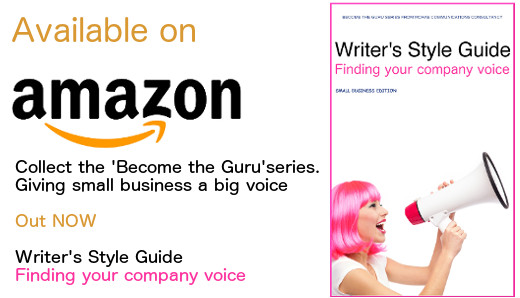 When I meet people for the first time, they always ask “what do you do for a living?”
When I meet people for the first time, they always ask “what do you do for a living?”
Many people who know me, personally and professionally, know that I am a “writer”. A few of my friends, family and colleagues may even go one step further and acknowledge in hushed tones that I have “something to do with marketing”. However, I realised at a recent family get-together that none of my family actually knew what I did on a day-to-day basis. It then occurred to me that many colleagues in some of the businesses I have worked in may not have understood what a writer did either.
If you looked for the definition of the word “writer” in the dictionary, you would find something along these lines:
Writer: noun
- a person engaged in writing books, articles and/or stories
- an occupation or profession; an author or journalist.
- a clerk or scribe
- a person who commits his or her thoughts and ideas to writing: an expert letter writer.
- (in a piece of writing) the author (used as a circumlocution for “I,” “me,” “my,” etc.):
The writer wishes to state … - a person who writes or is able to write: a writer in script.
While this is all generically accurate, it doesn’t begin to illustrate the vast differences between the various types of writers within the workplace, or the value they add to the company’s bottom line.
So what value does a writer bring to the workplace?
If you look at the last bullet point, you will see that a writer is ‘a person who writes or is able to write’. Of course that is true in the most basic sense, however, when it comes to writing in the workplace, there is a certain amount of discipline and expertise involved, depending on the nature of the writing role or the company itself.
Let’s take a look at different types of writers in the workplace:
The Copywriter is a person who develops/creates copy for the purpose of marketing and advertising a person, business, opinion, solution or idea.The purpose of marketing copy or promotional materials is to persuade the reader, listener or viewer to act – normally under the banner of a communications campaign which would include every piece of written content you can imagine from brochures, fact sheets, white papers, case studies, advertisements, to press releases, multimedia scripts, sales kits and so on.
As part of a marketing communication team, the copywriter has an important role in helping to define and execute the hierarchy of messaging, taglines, positioning statements and value propositions. These are the “stories” or ‘themes” that run through every campaign all carefully choreographed with a specific objective in mind. Ultimately all communications must resonate with the intended audience.
More often than not, the copywriter has to take a step back, view their campaigns and writings from a global perspective (not just from their own viewpoint or that of a pushy product manager who wants their brochure to read their own special way). The copywriter will be responsible for taking an overview of all the ideas and agendas pushed forward by stakeholders, and will have to reconcile these with what the customer needs, what the company is trying to achieve, and what the competitors are doing.
From the quality control, nitty-gritty of proofreading every piece of written content, to the overall delivery of brand messaging, the copywriter must have eagle eyes across the written content the business is generating, making sure everyone is singing from the same song-sheet. In this role, the copywriter is often seen as the gatekeeper.
Technical writers are responsible, as the name would suggest, for writing technical content. The role of a technical writer is not to persuade the audience, but to educate, explain or inform them, to give them the information they need for a specific job. Often technical writers come from a more technical background rather than a writing background – though the two do occasionally overlap. In this role, the discipline is to be able to gather information, analyse it and present it back to the audience in clear documentation – such as a user manual, training material or specifications. The technical writer will have to ensure their content is one hundred percent accurate, down to the most granular level.
The Content writer is a role in its own right, but it is often merged into the copywriter’s day-to-day remit, however, nowadays, most companies are aware of the importance of their online presence, and tend to share out this function. The Content Writer creates content for websites, landing pages, online advertisements, email campaigns, landing pages, ad-word campaigns, social media content such as LinkedIn, blog posts, tweets and so on. They will generally have an understanding of content management systems, and a certain amount of technical know-how in HTML or javascript. Content writing on websites may include among its objectives the achievement of higher rankings in search engines. Known as “organic” search engine optimisation (SEO), this practice involves the strategic placement and repetition of keywords and keyword phrases on web pages, but still writing in a manner that human readers would consider normal (i.e. ,not contrived).
Tender, bids and proposal writer
A proposal writer (or bid or tender writer) can fill many different niches. When most people think of proposal writers, they automatically think of people who write requests for grant money. Although grant proposal writers are among the largest groups of proposal writers, there are many other types. For example, proposal writers can work in the entertainment industry, private industry or financial sector, and their roles within each industry may vary slightly. On a general level the tender writer must possess the ability to write clearly, concisely, and effectively. In addition, they must have an eye for the most minute detail – grammatical, typographical, and other errors are unprofessional and totally unacceptable at this level. A senior writer will be in charge of evaluating a proposal, strategising how it will fit into a company, and managing a deadline that will ensure that the proposal will reach the clients in a timely manner. The writer will also be responsible for drafting a proposal that emphasises a particular feature or capability company can offer clients or simply rewriting stock answers so that they are geared towards a specific client. Often these tender submissions can run into anything from 40 to 100 pages, and require the co-ordination of many teams, such as pricing or manufacturing. Imagine writing an application form for a job you really want and keep multiplying that in your mind to the value of winning or losing your company millions of pounds.
The last word …
This is just a taster of the type of work a writer does in the workplace and the expertise and value they bring to the table.
The written word is a potent form of communication and choosing the correct wording in your company’s website, collateral or advertisements is the vehicle to send your message straight to the minds of your audience. Even the most successful and entrepreneurial CEOs will openly admit that writing is not their forte – and it doesn’t need to be if they have a great writer on board. With this in mind, the writer in your organisation is a good person to get to know. They may save you making common mistakes which reflect badly on the organisation or even yourself.
“The written word is a
potent form of communication”
 Send to Kindle
Send to Kindle

